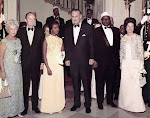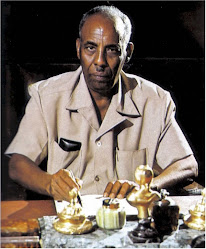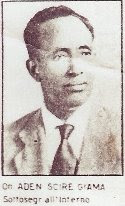update Ambassador Mahiga doesn't really want Peace in Somalia ? and
Reality check on ambassador Mahiga and his Friends’
Reflecting upon the charade that surrounded the UN Consultative Meeting (UN-CM) held at Mogadishu Airport at a time when the entire Somalia is overwhelmed by the worst drought and famine in 60 years, two questions came into my mind:
(1) Why the United Nations Political Office for Somalia (UNPOS) has decided to treat Somalis as ‘ignoramus characters’ who could not understand the significance and difference between: (a) a foreign-driven Initiative and Somali driven Initiative; (b) Directives from a master and Decisions made through internal deliberative process of Government; (c) A Country under Trusteeship and an Independent Country under a legitimate Government; (d) A hierarchical National Representative Government and Self-declared Autonomous Regional States, District Administrations and factional groups; (e) A legitimate Constitution-Making process and a foreign made Constitution with predetermined principles like Federalism clause?
(2) Why UNPOS has decided to misrepresent the real political and social condition in Somalia so to apply a destructive approach to it? Incidentally, the report of UN Monitoring Group on Somalia (S/2011/4033) has contradicted the false narratives of UNPOS. I don’t think there is a question about the fact that Somalis did not seriously help themselves but that failure cannot be an excuse for the ignoble and detrimental behavior of UNPOS and others.
The brief UN-CM held at Mogadishu Airport under the protection of AMISOM forces does not represent a significant political development. Contrary, it has glorified Machiavellian (crass) culture and further disgraced the Transitional Federal Government/Transitional Federal Institutions (TFG/TFIs), eviscerated by the Kampala Accord. For lack of transparency, the floated figure for the cost of the UN-CM is 12 million dollars.
UNPOS and the Ethiopian regime have joined their diplomatic machinery to force a deceptive political structure and agenda on Somalia, which will be an obstacle to the realization of reliable peace and stability in Somalia. The concerted, skillfully planned and well funded efforts of UNPOS and Ethiopia have killed the hope for a sustainable sovereign governance taking root in Somalia. PM Meles Zenawi of Ethiopia and his diplomatic corps spend more time and energy on Somalia rather than on the myriad problems of their country to influence the Western powers, China and Russia so that Somalia remain under the tutelage of Ethiopia. Somalia cannot be associated with the oppressive political and economic system of Ethiopia.
Informed personalities about Somalia’s politics and society are of the opinion that the current efforts of UNPOS and Ethiopia could produce unintended dynamics and consequences that will feed and nourish public resentment against the United Nations and the International Community (IC). The danger from the use of proxy Somali factions and unscrupulous personalities has been raised by authoritative sources. The fragmentation of Somali Society and support to dishonest controversial leaders whose main goal is access to power for personal gain will undermine the defeat of religious extremism and warlordism.
The new UNPOS strategy evolves from six sources:
1. The elevation of the priority on the war on terrorism and piracy. Pirates are holding 50 vessels and 528 hostages. The cited UN report has discovered that while Al Shabab has extended its influence throughout Africa and Arabian Peninsula and represented a great danger to international security, the internationally backed leadership of the Transitional Federal Government/Transitional Federal Institutions (TFG/TFIs) has became the principal impediment to security and stability in South-Central Somalia for lack of vision, endemic corruption and inability to advance the political process. Top leaders of TFG were accused of being infatuated with the monopoly of power and resources with the complicity of the IC.
2. The failure of the strategy that produced the leadership of President Sheikh Sharif and Speaker Sharif Hassan under the 2008 Djibouti process. The IC, against any common sense policy, decided to allow the doubling of the Transitional Federal Parliament (TFP) from 275 to 550 members. The concern of the IC was to punish Eritrea and weaken the opposition against Ethiopia’s invasion and interference in the internal Affairs of Somalia. But the handpicked additional 275 Members by the two leaders have symbolized a permission for corruption and personal rule.
3. The implementation of the Dual Track Policy the US Government has announced in dealing with Somalia’s statelessness. This policy is having a far reaching consequences that will derail the possibility of effective government in Somalia. The US Policy supports intentionally or unintentionally the long sought ambition of Ethiopia to dominate Somalia.
4. The required disbursements of the substantial funds donated to Somalia. The management of these funds are in the hands of donor representatives in Nairobi, Kenya.
5. The emergence of elements in the Somali Diaspora. These elements are either naïve, confused or indifferent to the history, culture, aspirations and interests of the Somali Citizens and they display lack of appreciation of the reasons behind the collapse of the Somali State and the complex problems that have arisen from the prolonged civil war.
6. The execution of the Ethiopian strategy in deepening the fragmentation among Somalis. The UNPOS Strategy in coordination with the Ethiopia-Kenya Strategy in Galgudud and Jubba Regions (Ahlu Sunna Wal Jama Conference in Abudwaq, Azania State and Ras-Kamboni Militia in Jubba Regions), focuses on fomenting and exacerbating political conflicts between South-Central and Puntland inhabitants and between various factions. The Somali people understand the interests and communities the Presidents of Puntland and GalMudug Regional States represent, but what they don’t understand is the communities and interests the leaders of TFG/TFIs represent, particularly in the negotiation with those Regional States and factional groups. The general perception is that TFG/TFI leaders represent their personal interests.
The Djibouti Agreement, the Kampala Accord, the UN Security Council Resolutions, the AU and IGAD decisions, the Agreements in Galkaio, Nairobi, Garowe, Addis Ababa and finally the Roadmap adopted by the stakeholders of the UN-CMC have nullified the Transitional Federal Charter (TFC), paralyzed the Parliament and consequently de-legitimized TFG/TFIs. Despite its involvement in Somalia since 2005, the National Democratic Institute (NDI) has failed to establish the Transitional Federal Parliament as an Institution representing the will of the people and working as a legislative body with best parliamentary practices and procedures.
A cursory review of the preparation, participation and the Roadmap of Mogadishu UN-CM reveals the following:
(1) Each TFG/TFI leader has separately nominated his loyalists to the meeting.
(2) The Council of Ministers, the Parliament, the Civil Society and the public have been deprived of their legitimate rights to have in depth debate on the Roadmap prepared by UNPOS before adoption. So called “Stakeholders” of the UN-CM have became overnight new national leaders.
(3) The process has made the President, Speaker and Prime Minister of TFG parallel officeholders with equal powers.
(4) Against the will of the Somali people and for no reason, PM Abdiweli Mohamed Ali has been mandated to appoint a Special Envoy to the Exclusive Economic Zone (EEZ) Commission. This is to circumvent the parliamentary rejection of the fraudulent Memorandum of Understanding signed between Somalia and Kenya. It is a travesty endorsed by UNPOS with the possible solicitation of Kenya, China and Norway.
(5) TFG/TFI, reduced to 9 Ministers and 3 top leaders, will function under the direction of UNPOS.
(6) The implementation of the transitional tasks with their benchmarks is empirically impossible and beyond the capacity of TFG/TFI. Thus, the Political Bureau established under the Kampala Accord for compliance may recommend to UN Security Council the suspension of Somali Sovereignty. This will strengthen the chance for the occupation of Somalia.
Reality check on ambassador Mahiga and his Friends’
Reflecting upon the charade that surrounded the UN Consultative Meeting (UN-CM) held at Mogadishu Airport at a time when the entire Somalia is overwhelmed by the worst drought and famine in 60 years, two questions came into my mind:
(1) Why the United Nations Political Office for Somalia (UNPOS) has decided to treat Somalis as ‘ignoramus characters’ who could not understand the significance and difference between: (a) a foreign-driven Initiative and Somali driven Initiative; (b) Directives from a master and Decisions made through internal deliberative process of Government; (c) A Country under Trusteeship and an Independent Country under a legitimate Government; (d) A hierarchical National Representative Government and Self-declared Autonomous Regional States, District Administrations and factional groups; (e) A legitimate Constitution-Making process and a foreign made Constitution with predetermined principles like Federalism clause?
(2) Why UNPOS has decided to misrepresent the real political and social condition in Somalia so to apply a destructive approach to it? Incidentally, the report of UN Monitoring Group on Somalia (S/2011/4033) has contradicted the false narratives of UNPOS. I don’t think there is a question about the fact that Somalis did not seriously help themselves but that failure cannot be an excuse for the ignoble and detrimental behavior of UNPOS and others.
The brief UN-CM held at Mogadishu Airport under the protection of AMISOM forces does not represent a significant political development. Contrary, it has glorified Machiavellian (crass) culture and further disgraced the Transitional Federal Government/Transitional Federal Institutions (TFG/TFIs), eviscerated by the Kampala Accord. For lack of transparency, the floated figure for the cost of the UN-CM is 12 million dollars.
UNPOS and the Ethiopian regime have joined their diplomatic machinery to force a deceptive political structure and agenda on Somalia, which will be an obstacle to the realization of reliable peace and stability in Somalia. The concerted, skillfully planned and well funded efforts of UNPOS and Ethiopia have killed the hope for a sustainable sovereign governance taking root in Somalia. PM Meles Zenawi of Ethiopia and his diplomatic corps spend more time and energy on Somalia rather than on the myriad problems of their country to influence the Western powers, China and Russia so that Somalia remain under the tutelage of Ethiopia. Somalia cannot be associated with the oppressive political and economic system of Ethiopia.
Informed personalities about Somalia’s politics and society are of the opinion that the current efforts of UNPOS and Ethiopia could produce unintended dynamics and consequences that will feed and nourish public resentment against the United Nations and the International Community (IC). The danger from the use of proxy Somali factions and unscrupulous personalities has been raised by authoritative sources. The fragmentation of Somali Society and support to dishonest controversial leaders whose main goal is access to power for personal gain will undermine the defeat of religious extremism and warlordism.
The new UNPOS strategy evolves from six sources:
1. The elevation of the priority on the war on terrorism and piracy. Pirates are holding 50 vessels and 528 hostages. The cited UN report has discovered that while Al Shabab has extended its influence throughout Africa and Arabian Peninsula and represented a great danger to international security, the internationally backed leadership of the Transitional Federal Government/Transitional Federal Institutions (TFG/TFIs) has became the principal impediment to security and stability in South-Central Somalia for lack of vision, endemic corruption and inability to advance the political process. Top leaders of TFG were accused of being infatuated with the monopoly of power and resources with the complicity of the IC.
2. The failure of the strategy that produced the leadership of President Sheikh Sharif and Speaker Sharif Hassan under the 2008 Djibouti process. The IC, against any common sense policy, decided to allow the doubling of the Transitional Federal Parliament (TFP) from 275 to 550 members. The concern of the IC was to punish Eritrea and weaken the opposition against Ethiopia’s invasion and interference in the internal Affairs of Somalia. But the handpicked additional 275 Members by the two leaders have symbolized a permission for corruption and personal rule.
3. The implementation of the Dual Track Policy the US Government has announced in dealing with Somalia’s statelessness. This policy is having a far reaching consequences that will derail the possibility of effective government in Somalia. The US Policy supports intentionally or unintentionally the long sought ambition of Ethiopia to dominate Somalia.
4. The required disbursements of the substantial funds donated to Somalia. The management of these funds are in the hands of donor representatives in Nairobi, Kenya.
5. The emergence of elements in the Somali Diaspora. These elements are either naïve, confused or indifferent to the history, culture, aspirations and interests of the Somali Citizens and they display lack of appreciation of the reasons behind the collapse of the Somali State and the complex problems that have arisen from the prolonged civil war.
6. The execution of the Ethiopian strategy in deepening the fragmentation among Somalis. The UNPOS Strategy in coordination with the Ethiopia-Kenya Strategy in Galgudud and Jubba Regions (Ahlu Sunna Wal Jama Conference in Abudwaq, Azania State and Ras-Kamboni Militia in Jubba Regions), focuses on fomenting and exacerbating political conflicts between South-Central and Puntland inhabitants and between various factions. The Somali people understand the interests and communities the Presidents of Puntland and GalMudug Regional States represent, but what they don’t understand is the communities and interests the leaders of TFG/TFIs represent, particularly in the negotiation with those Regional States and factional groups. The general perception is that TFG/TFI leaders represent their personal interests.
The Djibouti Agreement, the Kampala Accord, the UN Security Council Resolutions, the AU and IGAD decisions, the Agreements in Galkaio, Nairobi, Garowe, Addis Ababa and finally the Roadmap adopted by the stakeholders of the UN-CMC have nullified the Transitional Federal Charter (TFC), paralyzed the Parliament and consequently de-legitimized TFG/TFIs. Despite its involvement in Somalia since 2005, the National Democratic Institute (NDI) has failed to establish the Transitional Federal Parliament as an Institution representing the will of the people and working as a legislative body with best parliamentary practices and procedures.
A cursory review of the preparation, participation and the Roadmap of Mogadishu UN-CM reveals the following:
(1) Each TFG/TFI leader has separately nominated his loyalists to the meeting.
(2) The Council of Ministers, the Parliament, the Civil Society and the public have been deprived of their legitimate rights to have in depth debate on the Roadmap prepared by UNPOS before adoption. So called “Stakeholders” of the UN-CM have became overnight new national leaders.
(3) The process has made the President, Speaker and Prime Minister of TFG parallel officeholders with equal powers.
(4) Against the will of the Somali people and for no reason, PM Abdiweli Mohamed Ali has been mandated to appoint a Special Envoy to the Exclusive Economic Zone (EEZ) Commission. This is to circumvent the parliamentary rejection of the fraudulent Memorandum of Understanding signed between Somalia and Kenya. It is a travesty endorsed by UNPOS with the possible solicitation of Kenya, China and Norway.
(5) TFG/TFI, reduced to 9 Ministers and 3 top leaders, will function under the direction of UNPOS.
(6) The implementation of the transitional tasks with their benchmarks is empirically impossible and beyond the capacity of TFG/TFI. Thus, the Political Bureau established under the Kampala Accord for compliance may recommend to UN Security Council the suspension of Somali Sovereignty. This will strengthen the chance for the occupation of Somalia.
Paragraph 8 of the Communiqué of the 18th Extra-Ordinary Session of the IGAD Assembly of Heads of States and Governments held in Addis Ababa, on July 4th, 2011 demanded that all International Actors working towards peace in Somalia to do so in consultation and concurrence with IGAD (Ethiopia) because of its self granted central role. President Sheikh Sharif and his Ministerial delegation who attended the Session committed impeachable offences when they surrendered the Somali sovereignty to IGAD (Ethiopia). The Supreme Court and the legal experts of Somalia have the responsibility to investigate the offenses committed for the defense of the sovereignty and independence of Somalia.UNPOS is not oriented to serve the interests of the Somali people. TFG leaders can give away the rights, independence and dignity of the Somali people but they cannot be trusted with the international resources. Somalis must take back their country before it is too late if they want to avoid the fate Eritrea suffered in 1950 when it was annexed to Ethiopia under UN Resolution 390A(V).
Mr. Mohamud M Ulus mohamuduluso@gmail.com via our freands SomaliTalk.com




.jpg)











No comments:
Post a Comment